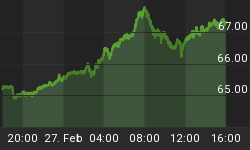The National Bureau of Economic Research is the official arbiter of economic expansions and contractions. Their official recession calls tend to be after the fact, and usually after much pain has been suffered by investors in the stock market. Even now, there is a great debate amongst economists. Is the US economy in a recession? Is it a soft patch? Are we headed for a recession? Ask two economists, and you will get 3 opinions. Obviously, it is important to know, and to know early as such a deflationary event will have a great impact on which assets will outperform and which will lag. Suffice it to say it isn't trivial.
I have developed an indicator that correlates nicely with past recessions, and it is suggesting a high probability that the USA is currently in a recession. The indicator uses readily available data. The first data point is the price of the SP500. The second data point comes from the weekly leading economic indicator published weekly by the Economic Cycle Research Institute. The third data point comes from the Chicago Federal Reserve, and this is the Chicago Fed National Activity Index (CFNAI), which is constructed from 85 data inputs itself. These three data points generate my simple recession indicator, which goes back to the start of the ECRI and CFNAI data series in 1967.
Figure 1 is a monthly chart of the SP500. The indicator in the lower panel shows expansion and contractions as determined by the NBER. When the indicator is down, then this represents a recession. The red labeled price bars represent those times my simple 3 input indicator suggested a recession was coming.
Figure 1. SP500/ monthly
Since 1967, there have been 7 recessions. In 1970, the indicator warned of a recession 1 month before the official start of the recession. In 1974, 1980, and 1981, the indicator signaled recession 3 months after the official start. It was 1 month late in 1990. In 2000, it was 6 months early. In 2008, the indicator nailed the start of that recession. Figure 2 shows 1970 to 1990.
Figure 2. SP500/ monthly
There have been two false positives. (See the ovals on figure 1.) One was at the end of the 2001/ 2002 bear market, and the second was August, 2010. It should be noted that many analysts were predicting recession back then, but the Fed had other ideas - namely QE2. Their high octane efforts put off the recession for another year.
Is the US economy in a recession?
The answer is most likely. We will need to wait several weeks to get the September CFNAI data. A negative reading will keep the indicator below zero. 4 out of the last 6 values of the indicator have been negative, and it would take a positive number not seen in over 10 years to turn the indicator upward. It doesn't seem likely.
A simple indicator constructed from readily available data is suggesting with great certainty that the US economy is already in a recession. Will the Fed be able to pull another QE out of its hat thus distorting and delaying the inevitable? I am sure they will try.















